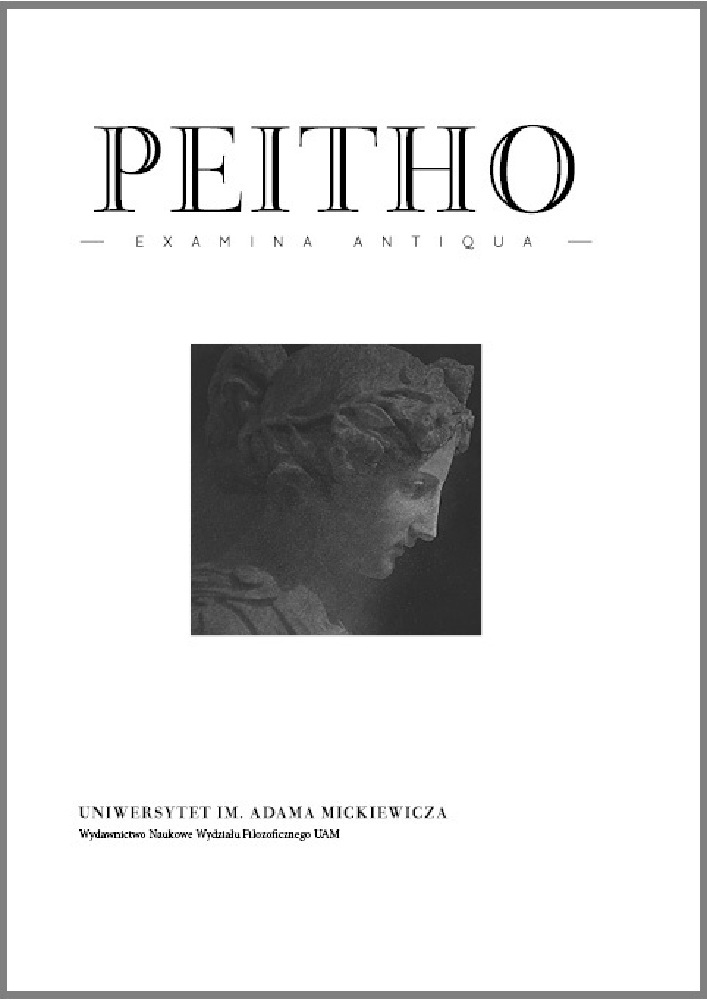Abstract
The present paper is the first Polish translation of the following excerpts from the Author’s original and innovative book entitled Platon (Beck, München 2006): IV 4. a) Kritik der Schriftlichkeit; b) Hören des Richtiges, Verfehlen der Wahrheit: Platons Kritik der Mündlichkeit; IX 1. Schriftlicher Dialog und mündliches Prinziepiendenken; 2. Einheit und Vielheit: Ein Rekonstruktionsversuch; 3. Mündliche Lehre als Ergänzung des schriftlichen Dialogs. The book represents a new paradigm in research on Plato and the topics developed in it constitute a concise and coherent account of Plato’s critique of writing and orality as well as the related theory of principles. While these issues continue to be an area of scholarly debate, the authors groundbreaking proposals provide an invaluable point of reference for anyone truly interested in Plato’s philosophy. We are extremely grateful to the Author as well as the Publisher for their permission to publish a Polish translation of the aforementioned parts of this excellent book.
References
Brisson, L., 2000, Lectures de Platon, Paris.
Cherniss, H., 19622, The Riddle of the Early Academy, New York.
Erler, M., 1987, Der Sinn der Aporien in den Dialogen Platons, Berlin i New York.
Erler, M., 2007, Platon, München.
Erler, M., 2007, „Platon“, w: K. Flashar (hrsg.), Grundriss der Geschichte der Philosophie. Die Philosophie der
Antike, Band 2, 1, Basel (fundamentalne opracowanie).
Gaiser, K. (hrsg.), 1969, Das Platonbild. Zehn Beiträge zum Platonverständnis, Hildesheim.
Gaiser, K., 1980, „Plato‘s enigmatic lecture On the Good”, Phronesis 25, s. 5–37 („Enigmatyczny wykład Platona O Dobru“, Przegląd Filozoficzny 3 (1997), s. 187–218).
Gaiser, K., 19682, Platons ungeschriebene Lehre. Studien zur systematischen und geschichtlichen Begründung der Wissenschaften in der platonischen Schule, Stuttgart.
Gaiser, K., 2004, Gesammelte Schriften, T.A. Szlezák (hrsg.), Saint Augustin.
Krämer, H.J., 1982; 20016, Platone e i fondamenti della metafisica. Saggio sulla teoria dei principi e sulle dottrine non scritte di Platone con una raccolta dei documenti fondamentali in edizione bilingue e bibliografia, Milano.
Krämer, H., 2014, Gesammelte Ansätze zu Platon, D. Mirbach (hrsg.), Berlin i Boston.
Luther, W., 1961, „Die Schwäche des geschriebenen Logos. Ein Beispiel humanistischer Interpretation, versucht am sogenannten Schriftmythos in Platons Phaidros (274B6ff )“, Gymnasium 68, s. 526–548.
Reale, G., 2013, Per una nuova interpretazione di Platone. Rilettura della metafisica dei grandi dialoghi alla luce delle “Dottrine non scritte”, Milano.
Richard, M.-D., 1986; 2006, L’enseignement oral de Platon. Une nouvelle interprétation du platonisme, Paris.
Robin, L., 1908 (19632), La théorie platonicienne des idees et des nombres d’apres Aristote, Paris.
Schlaeiermacher, F., 1969, „Einleitung zu Platos Werken“, w: K. Gaiser (hrsg.), Das Platonbild. Zehn Beiträge zum Platonverständnis, Hildesheim, s. 1–32.
Stenzel, J., 1924 (19593), Zahl und Gestalt bei Platon und Aristoteles, Leipzig.
Szlezák, T.A., 1985, Platon und die Schriftlichkeit der Philosophie. Interpretationen zu den frühen und mittleren Dialogen, Berlin i New York.
Szlezák, T.A., 2003, Die Idee des Guten und Platons Politeia. Beobachtungen zu den mittleren Büchern, Sankt Augustin 2003.
Szlezák, T.A., 2004, Das Bild des Dialektikers in Platons späten Dialogen, Berlin i New York.
Vlastos, G., 1963, “On Plato’s Oral Doctrine”, Gnomon 41, s. 641–655.
License
Peitho provides immediate open access to its content on the principle that making research freely available to the public supports a greater global exchange of knowledge.
